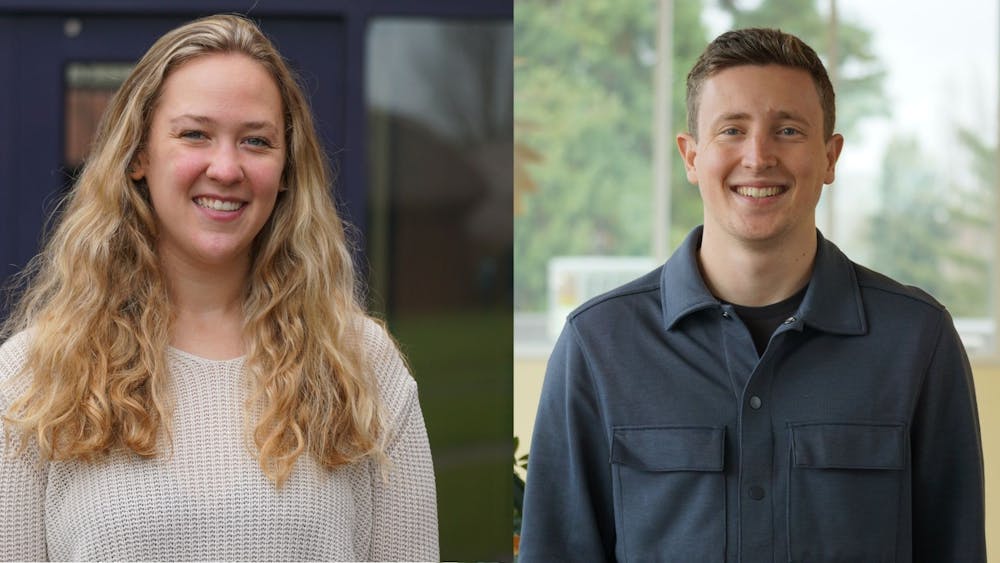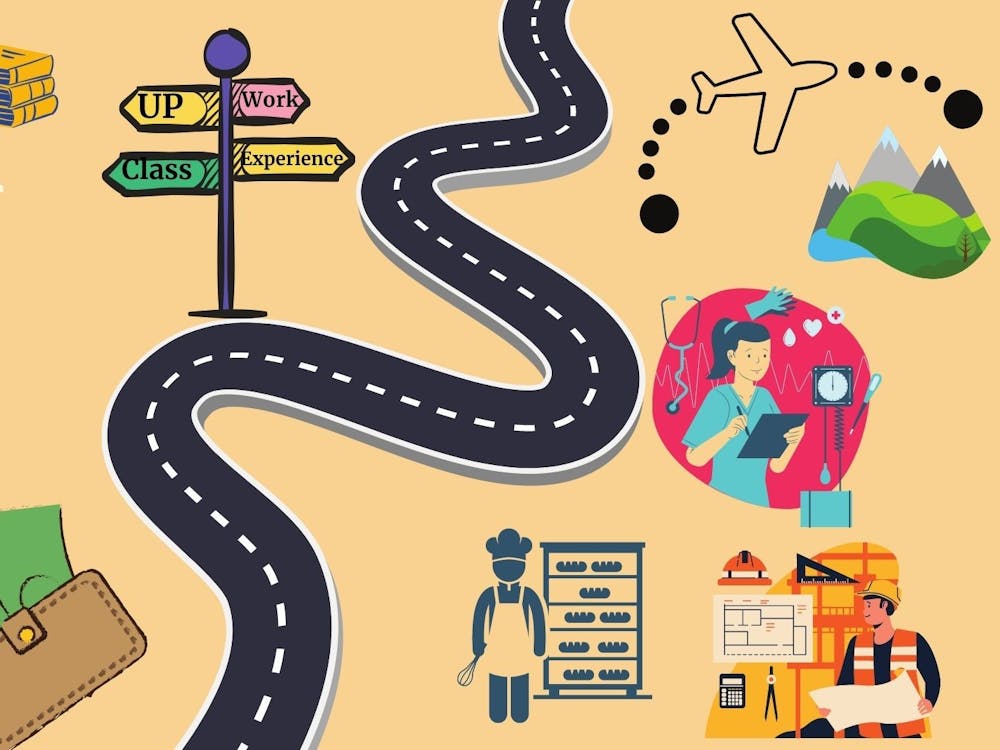Liam Jason, senior communication studies major, was able to call popping popcorn and watching movies with his housemate work for his senior capstone project. While it sounds like this research would have been a piece of cake, it was still a time-consuming and arduous task — requiring extensive qualitative research methods and protocols.
Filling out the IRB paperwork and writing a literature review weren’t the most exciting things Jason has done while at UP, but it’s the project that he’s most proud of when looking back at his academic career.
“That work was very rewarding,” Jason said. “We take all these classes and write all these papers, and you start to think, ‘What do I still really know?’ But I felt like when I was going into this research, there was a subconscious perspective involved that I had gleaned from my education.”
Communication studies majors are required to take two research courses and a senior capstone project — an assignment that takes some careful thought, time commitment and a little bit of creativity. Students are encouraged to pick their topics based on things that spark their interest and, by the end of it, they become somewhat of an expert in their research field.
Research projects can be a daunting task, with only one semester to conduct a study. Two students agreed to sit down with The Beacon to offer an inside look at what it was like to get these projects done.
What is qualitative research?
These students used qualitative research methods — the practice of collecting data through open-ended questions and conversation — to conduct their capstone projects. Associate professor of communication studies, Natalie Nelson-Marsh, enjoys seeing the shift when students become the expert and piece all of their knowledge together to form a cohesive and comprehensive study.
“I like the shift because the expert becomes the student,” Nelson-Marsh said. “Their voice in their project takes over and by the end of it, they know more about their topic area than I do. It makes teaching those classes incredibly fun, rewarding and inspiring.”
But why does this specific approach matter? To Nelson-Marsh, it helps us understand why and how we can change things for the better.
“It is really getting to understand the meanings that humans create and how communication does important things,” Nelson-Marsh said. “It creates relationships, cultures, and problems too. It’s also a mechanism for transforming how we do things in ways that we hadn’t anticipated before. It’s innovative.”
Liam Jason, Senior Communication Studies – Stereotypes in Movies and TV

Senior communications student Liam Jason holding the notebook and TV remote used to take fieldnotes.
Jason’s research was conducted through watching movies and TV that were all post-2010 and contemporary works. He did a lot of coding and analysis, which meant taking notes anytime something was mentioned in the script of the movie or show about each character – including their development, casting choice, dialogue and title of the work.
He selected three TV shows and roughly 12 movies to focus on, which meant he spent a majority of his time scribbling on his notepad while he and his housemates watched and listened. Along with watching all of the works, Jason had to conduct a literature review.
“I'd say 90% of [the literature review] criticized Hollywood and said the movie industry helps to perpetuate harmful stereotypes,” Jason said. “Which started out as the context of my research.”
But as Jason continued, his findings suggested that many contemporary works are trying to undo this process. He noticed that their works were being titled a certain way, characters were given a name that held significance and traditional lead roles were being cast by people with a more diverse background.
“For example, one of the movies I watched had a minority female as a lead of a huge corporation,” Jason said. “Traditionally, that would not have been cast, especially as it would have disagreed with the previous literature reviews.”
He felt that what made his work valuable and interesting was how it differed from previous research done on the Hollywood entertainment industry.
“My overall findings celebrated the Hollywood industry, and entertainment industry in general, for trying to undo some of its previous wrongdoings, getting more accurate in its representation by being inclusive and diverse,” Jason said.
He felt that his work may have been skewed due to the focus on contemporary works, but is still proud to offer a new perspective of how mass media is changing.
“Overall it’s valuable research in that it just takes a new perspective,” Jason said. “This is a platform by which segregation and other social wrongdoings can be perpetuated, but it's no longer doing that for many of the works I researched. It just granted a lot of power to mass media and acknowledged how these forms are increasingly accessible to everyone.”
At the end of his research study, Jason found that this type of media has certain leniency when it comes to inspiring social change, meaning it has more freedom to push certain narratives, whether it be good or bad.
“The fact that movies and TV are not ‘serious’ forms of media actually allows them to be more influential,” Jason said, “Because they're not going to receive as much backlash like CNN or something like that, so they are overall kind of like a subtle gateway to inspiring social change.”
Jason found that pulling together lessons from across his classes was like a stressful game of “connect the dots.” He found himself constantly thinking about what he could do to make his work better — even when he was just trying to relax.
“If you have to do a capstone semester-long, go for fall [semester] 100%,” Jason said. “Because that was always in the back of my mind, even if I was up to date on where I should be with it because it was such a big deal. I feel so much relief this semester compared to fall because it's a semester-long project – Sure you have all the time, but that means you're thinking about it for the whole semester.”
Caroline Dockerty, Senior Organizational Communication – How language impacts organizational culture

Senior communications student Caroline Dockerty reading her fieldnotes.
Photo illustration: Marek Corsello
Dockerty did her study on the language used by technology organizations, and was interested in using her background to make improvements in the industry. She had little experience in the area, but was fascinated by the language she heard some of her computer science friends using.
“I remember sitting at dinner one night and they were talking about something related to their work that morning,” Dockerty said. “And one of them had used the term master to refer to one computing system and slave to refer to another.”
She was caught off guard by the remark and they reassured her that it was just the type of terminology that was used.
“I think the industry could use a little updated language,” Dockerty said. “So that's the angle that I was taking going into it, but then as research projects go, I discovered a lot more about the intricacies of language and the different ways that they affect organizational culture, not just in that respect, but in others too.”
Inspired by her friends back home, Dockerty based her research study off of a public technology conference she attended and analyzed the way they communicated with each other in a virtual setting.
Once Dockerty began her observations, she was shocked by how direct and slightly egotistical a lot of people in this field were. She found that they do not pay close attention to how their language is affecting others and elements of compassion were being put on the backburner.
Even though this was alarming on the surface, she acknowledges that it doesn’t make them bad people, but instead shows they are unaware of how language impacts their work culture.
“Those people were not bad in terms of them being bad people,” Dockerty said. “But just in terms of how the industry was formed, and dominated by a lot of white men. A lot of that still is very present in the industry, especially the leadership.”
While the research was rewarding, it didn’t come without its challenges. Dockerty was actively participating in meetings and having to do tedious research on certain terminology or abbreviations they would use, reinforcing her feeling of being an outsider in an insider-focused group.
Another challenging aspect was conducting most of her research in an all-virtual format — this was during the height of COVID-19 regulations. Dockerty attended a week-long conference that was based on coordinated universal time (UTC).
“I truly had no idea what that was and had to adjust for Pacific time,” Dockerty said. “And it was not easy. We had a meeting at 3 a.m. Pacific time. While some of them were recorded, we had to operate on this crazy schedule.”
It was an international conference with people from all over the world, trying to coordinate on one time zone with the added difficulty of not everyone speaking the same language, even though the conference was in English.
If there was one thing that she could do differently, it would be doing the project in-person rather than virtually.
“The way the conference was set up, there was a video going and then there's also this ongoing chat log,” Dockerty said. “I wished I could have watched the dynamics unfold both in the chat log and on screen. I could see where there might be some intricacies in person like facial expressions, that would be really cool.”
Quick tips on how to tackle a research project
Pick a subject you are passionate about and think outside the box. It will make it easier to write about in these lengthy papers (Jason’s capstone ended up being around 33 pages long) and will also make you stand out when presenting.
If you are able, take your capstone class during the fall semester. It will make your last semester of college less stress-inducing and overwhelming.
Start working on your project in bite-sized chunks. It may seem like time flies but remind yourself you have a whole semester to work on it.
Utilize your resources in the library and your professor. They want to help make the most out of your experience.
Brie Haro is the Community Engagement Editor and can be reached at haro23@up.edu.








